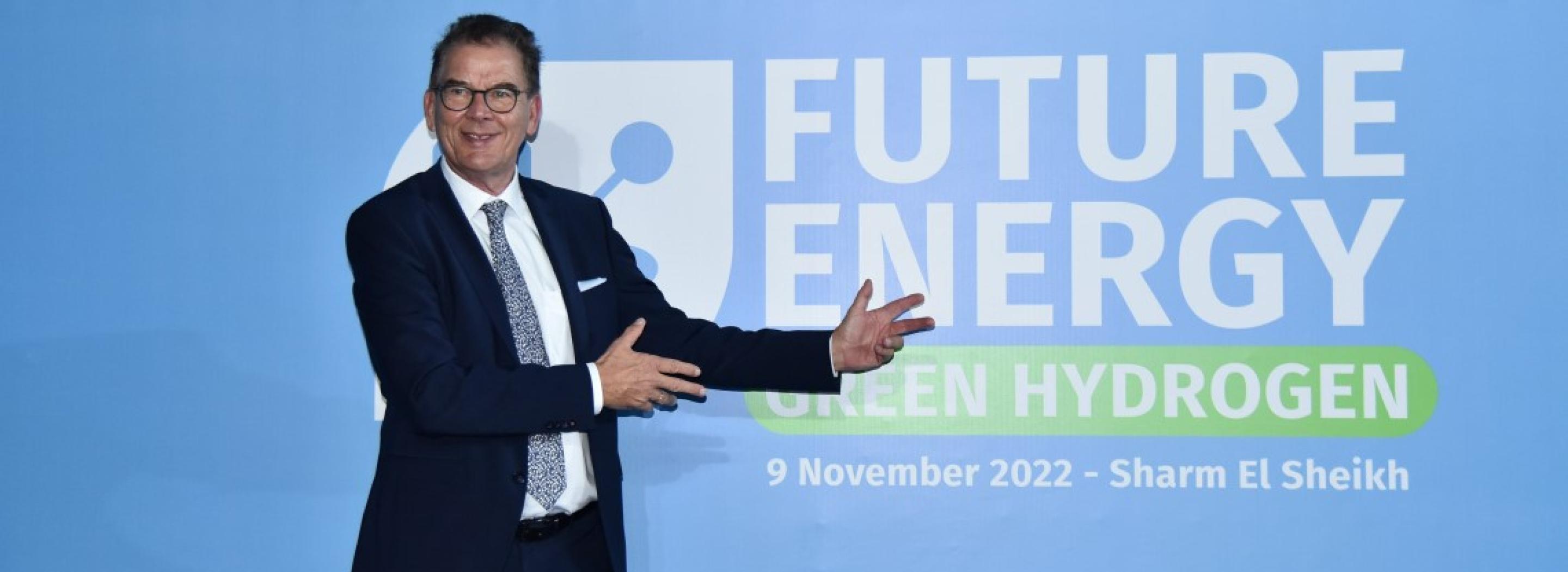Events and Meetings
Latest Events
Advanced Filter
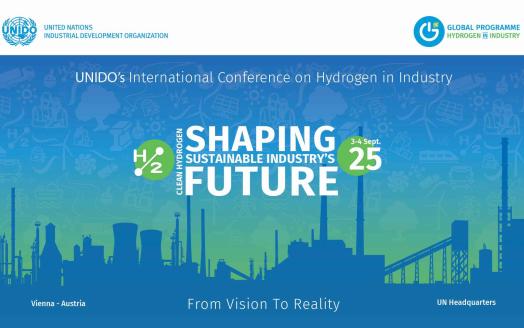
3 September 2025
Events
UNIDO's International Conference on Hydrogen in Industry
On September 3–4, UNIDO, in collaboration with UN agencies and key international partners, will host the International Conference ‘Clean Hydrogen: Shaping Sustainable Industry’s Future’ at the UN premises in Vienna. The event aims to encourage transformative changes in local industries of developing countries and transition economies through the sustainable application of clean hydrogen.
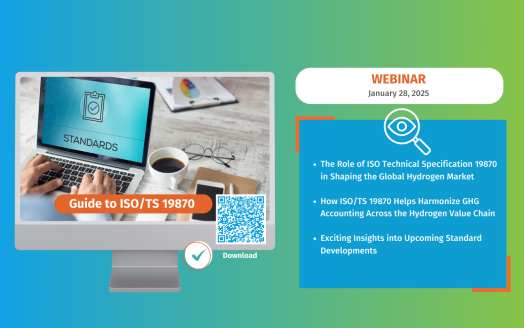
28 January 2025
Events
Exploring the Global Standard for Hydrogen GHG Assessment - Second webinar
Following the success of the first webinar session on the Guide in 2024, UNIDO hosted a second session focused on the relevance of Technical Specification 19870:2023 to the global hydrogen market. The discussion also covered how the UNIDO-ISO Guide, dedicated to this specification, can help harmonize GHG accounting, as well as upcoming hydrogen-related developments planned by ISO. ISO/TS 19870:2023 is a comprehensive methodology for determining greenhouse gas emissions across the hydrogen value chain, from raw material extraction to the consumption gate. Developed through broad international consensus, it is designed to harmonize and streamline the partial carbon footprint calculation (the GHG emissions of specific segments of the supply chain) for various technology pathways in the hydrogen value chain. UNIDO and International Organization for Standardization (ISO) have developed the Guide to ISO/TS 19870:2023 to make this methodology more accessible to practitioners, industry professionals, and government stakeholders. By promoting the use of ISO/TS 19870:2023, the guide strengthens ISO/TS 19870:2023 position as the international benchmark for GHG assessment in the hydrogen value chain, encourages adoption by a broader range of stakeholders, and fosters its implementation in diverse economies—ultimately contributing to a more unified global hydrogen market.Speakers:Petra Schwager, UNIDO, Chief of Climate and Technology Partnerships DivisionGabriel Lassery, International Consultant (UNIDO) and Executive Superintendent (ABH2)Andrei V. Tchouvelev, Chair of TC197/SC1 (ISO) and Principal Advisor to the CEO (Hydrogen Council)Maria Sandqvist, ISO, Strategic Partnership Manager The webinar recording can be watched below:
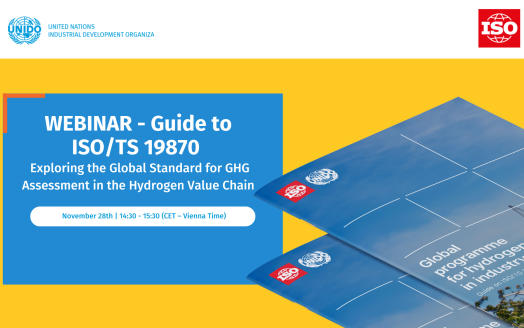
28 November 2024
Events
Practical Guidance on ISO Technical Specification TS 19870
Vienna: UNIDO hosted a webinar introducing a joint ISO-UNIDO Guide, designed to clarify the ISO’s Technical Specification for assessing greenhouse gas emissions across the hydrogen value chain, ensuring professionals & policymakers can effectively understand and apply it.Speakers from partner organization provided their insights on the technical specification and highlighted the value of the Guide: ✅ Petra Schwager (UNIDO):Hydrogen has a great potential to drive sustainable industrialization, particularly in developing and transition economies. Standards are crucial for enabling fair trade and ensuring no country is left behind in the hydrogen economy. ✅ Noelia Garcia Nebra (ISO - International Organization for Standardization):ISO TS 19870 enhances transparency and comparability across hydrogen markets while complementing other ISO standards on environmental assessment management. We welcome our collaboration with UNIDO. Our joint Guide introduces the technical specification, highlights its practical applications, ensuring that stakeholders across the value chain can understand the specification & implement its requirements effectively. ✅ Laurent ANTONI (International Partnership for Hydrogen and Fuel Cells in the Economy)Carbon footprint is what matters for climate change, and that's why we need to be colour-blind and agree on how to effectively measure and quantify the emissions in the hydrogen supply chain. ✅ Maximilian Kūhn, PhD (Hydrogen Europe)Aligned with European goals, the standard will likely play an important baseline for regulatory revisions, helping hydrogen markets thrive. ✅ Daria Nochevnik (Hydrogen Council):The methodology builds on years of collaboration between experts around the world and represents a very hard-earned global consensus on GHG emissions assessment. It fosters investor confidence and supports certification schemes essential for bankable hydrogen projects. The Guide, unveiled today, ensures the standard is more accessible to the wider community of experts and professionals. ✅ Gabriel Lassery (UNIDO)ISO TS 19870 is a very important tool for facilitating cross-border trade for hydrogen and its derivatives. 📍The Guide is available here➡️ Guide on ISO/TS 19870: Promoting the Global Standard for GHG Assessment in the Hydrogen Value Chain | UNIDO Green Hydrogen The session underscored the importance of standardisation in unlocking hydrogen’s potential. ISO TS 19870 serves as a vital benchmark, with future developments in the 19870 family planned to address specific elements of the hydrogen supply chain, such as the ISO 19870-1, focused on hydrogen production.
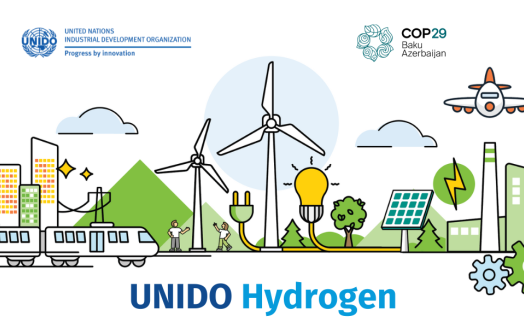
14 November 2024
Events
UNIDO Hydrogen Agenda at COP29: Industry Solutions for People and Planet
Scaling up the production and deployment of low-emission hydrogen and its derivatives is essential to accelerate the global clean energy transition, limit temperature rise to 1.5°C above pre-industrial levels, and achieve SDG7’s goal of ensuring access to affordable, reliable, sustainable, and modern energy for all. At COP29, the UNIDO hydrogen team had an intense and productive time filled with insightful side-events, presentations, and valuable meetings with global stakeholders. The Conference provided an excellent opportunity to strengthen relations with the Programme's key partners and highlight UNIDO's mission in hydrogen: promoting low-emissions hydrogen production and use in developing countries and economies in transition, with the goal of fostering innovative industries and generating economic & social benefits for local communities. See highlights below.
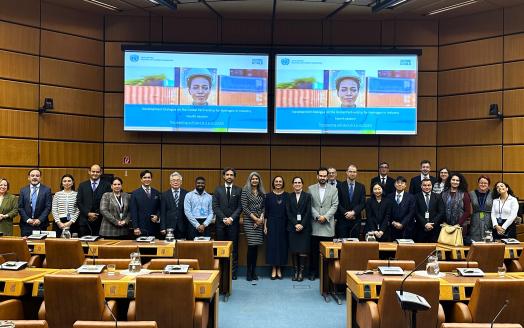
15 October 2024
Events
The fourth Development Dialogue on UNIDO’s Global Partnership for Hydrogen in Industry
UNIDO hosted the fourth session of the Development Dialogue on its Global Partnership for Hydrogen in Industry at its headquarters in Vienna. The event, held in a hybrid format, brought together representatives from Member States, including their Permanent Missions, industries, and other key stakeholders to discuss hydrogen's role in sustainable development.Building on previous sessions (example), the Dialogue introduced UNIDO's key initiatives such as the Global Clean Hydrogen Programme. Expert panellists from government, industry, and development finance institutions provided insights on hydrogen standards, certification schemes, financing mechanisms, and skills development. The event also featured a briefing on the upcoming Hydrogen Declaration for COP29 and addressed opportunities for collaboration to scale hydrogen solutions globally.Managing Director, Gunther Beger, opened the Dialogue by emphasizing the importance of clean hydrogen in the global energy transition. He highlighted UNIDO’s role in supporting capacity building, fostering collaborations, and driving hydrogen adoption in developing and transition economies. Concluding, he stressed the significance of partnerships, stating: "A just hydrogen transition requires collaboration from all of us. By sharing knowledge and resources, we can ensure that the benefits of this transition reach developing nations. The insights shared today will help us align our global efforts and build the partnerships needed for a sustainable and inclusive hydrogen economy. I am confident that together, we can find effective solutions to unlock the full potential of clean hydrogen."Summary of the key messages from each speaker is presented below:Petra Schwager (Chief, Climate and Technology Partnerships Division, UNIDO): Spoke about UNIDO’s Global Programme for Hydrogen in Industry, stressing the need for countries to use hydrogen for building up their own industries. She highlighted the importance of partnerships and UNIDO’s collaboration with various organizations to ensure a just and sustainable hydrogen transition.Clovis Zapata (Country representative in Brazil, UNIDO): Highlighted Brazil’s central role in the global hydrogen market, leveraging its renewable energy potential. He discussed the country's commitment to expanding low-carbon hydrogen production and the national regulatory measures to support this, with the goal of making Brazil a leader in low-carbon hydrogen by 2030.Andrei Bazan (First Secretary, Alternate Permanent Representative and Consul, Philippines Embassy and Permanent Mission to the United Nations and other International Organizations in Vienna): Addressed the Philippines' efforts to develop hydrogen as a clean energy source, in line with the country’s energy security and low-carbon goals. He emphasized the role of hydrogen in boosting national capacities and the importance of UNIDO’s support in de-risking investments and developing policy frameworks.Dr. Pradeep Tharakan (Director, Energy Transition, Asian Development Bank): Focused on ADB's commitment to supporting hydrogen development through large-scale renewable energy projects. He highlighted the importance of hydrogen hubs and the role of financing mechanisms to de-risk hydrogen investments, particularly in the Asia-Pacific region.Dr. Carla Robledo (Senior Policy Advisor, Ministry of Climate Policy and Green Growth, The Netherlands): Underscored the importance of the International Hydrogen Trade Forum (IHTF) in promoting collaboration between hydrogen-exporting and importing regions. She highlighted UNIDO's significant role as forum coordinator and emphasized the necessity of creating demand, developing infrastructure, and securing financing to scale global hydrogen trade, particularly in emerging markets.Björn Noack (Power Solutions, Director Governmental Affairs Electrolysis (PS/SGO-EY, Bosch): Presented Bosch’s approach to supporting the energy transition through hydrogen technologies. He emphasized the company’s focus on scaling hydrogen production by manufacturing PEM electrolyzer stacks and contributing to local hydrogen ecosystems through supply chain development.Luis Umanzor (Industrial Development Officer, Climate and Technology Partnerships Division, UNIDO): Highlighted UNIDO’s Global Clean Hydrogen Programme, developed in collaboration with the Global Environment Facility (GEF). The program supports countries by enhancing their capacity, policy frameworks, and technical readiness for hydrogen production and local application. He emphasized the importance of pilot projects as learning tools and UNIDO's efforts in promoting green hydrogen industrial clusters to develop local industries based on renewable energy.Dr. Xue Wang (Chief of Application Division, International Hydrogen Energy Center, China): Discussed the International Hydrogen Energy Center’s work on hydrogen technology and industrialization. Wang emphasized large-scale hydrogen production and long-distance transportation projects, including a demonstration project in Inner Mongolia, China.Smeeta Fokeer (Research and Industrial Policy Officer, Climate and Technology Partnerships Division, UNIDO): Discussed the Hydrogen Declaration for COP29, which UNIDO has been entrusted with coordinating. The Declaration focuses on decarbonizing existing hydrogen production, increasing demand for clean hydrogen, and ensuring a just transition. She also highlighted that UNIDO will host several key hydrogen-related events at COP29, highlighting its role in advancing sustainable hydrogen projects and fostering global partnerships.
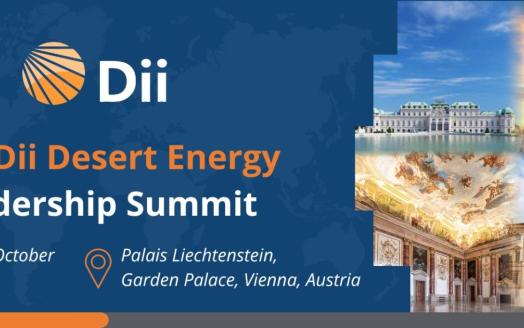
15 October 2024
Events
14th Dii Desert Energy Hydrogen Leadership Summit
The UNIDO hydrogen team was pleased to be a supporting partner of the 14th Dii Desert Energy Leadership Summit, joining hands with leaders from the public and private sectors to drive net-zero industrial development and an inclusive hydrogen transition. UNIDO's Managing Director, Gunther Beger and Petra Schwager, Chief of the Climate and Technology Partnerships Division, attended the summit to share insights into the organization's strategy and experiences from global programs and projects.
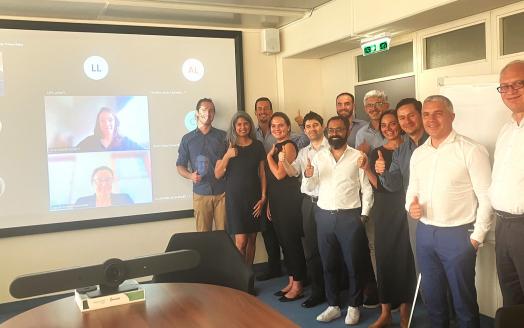
29 August 2024
Events
Expert Group Meeting on Skills Development for a Just Hydrogen Transition
The global hydrogen economy has the potential to create 20-25 mn jobs by 2050 in hydrogen production and transportation, of which 50% are expected to be created in the emerging markets and developing economies. (Emerging Trade Corridors for hydrogen and its derivatives, Hydrogen Council & McKinsey, 2024)Background on the MeetingUNIDO is currently developing a skills gap mapping assessment methodology for assessing human capital gaps through a skills mapping approach tailored for developing countries. This assessment constitutes a comprehensive endeavour aimed at collecting both quantitative and qualitative data concerning the skills within a country's hydrogen value chain.The methodology's main goal is to identify and address existing gaps to design targeted strategies for skill enhancement and national-level training programs. The methodology is built upon three interrelated pillars: skills, professions, and industrial activities. Test-runs of the methodology has been carried out in Egypt, where an assessment of relevant technical skills and competences imparted through universities and vocational centres was carried out as well as the identification of relevant professions for green hydrogen value chains.The target groups and potential beneficiaries of the methodology range from the public and private sector, including representatives from industry, academia and the government as well as the society (e.g. associations that promote gender equality and women’s empowerment, or environmental protection) involved in enhancing sustainable productivity growth, and contributing to inclusive and sustainable industrial development globally and especially in developing countries.The EGM aimed atGathering insights on stakeholder initiatives for developing technical skills in hydrogen.Receiving feedback on UNIDO’s skills gap mapping methodology.Discussing the next steps for collaborative efforts on capacity building and skills development for the hydrogen transition.Key Messages of the MeetingThe hydrogen sector presents enormous opportunities for job creation, but we are not there yet. Building the required skills is essential to get the hydrogen industry off the ground. We need to train business case developers in finance, economics, and project management to create a solid foundation for the industry's growth.Given the potential risks, safety training to avoid accidents and prevent hydrogen leakages is critical for all stakeholders involved.Training policymakers on permitting processes is also crucial. Developing case studies on different permitting models will help streamline regulatory frameworks across regions.All training programs must evolve into viable business models for educational providers. Practical skills training, which can be costly, must be made accessible through public-private partnerships (PPPs) and regional training hubs.While many general hydrogen-related courses are available online, there is a significant gap in practical and technical training. Hands-on training facilities, including virtual reality systems, are necessary to provide safe, risk-free learning environments.Establishing regional hydrogen competence centres will provide both demonstration and training facilities, offering a cost-effective solution for hands-on experience in developing countries.Potential Areas of Cooperation identifiedAligning databases of occupational roles, skills, and academic profiles will ensure that the workforce is trained to meet the specific needs of the hydrogen value chain in each country.Exploring financing instruments to support robust training programs for hydrogen skills development is essential.Developing "train the trainers" courses and setting up networks will accelerate knowledge transfer and ensure a sustainable skills pipeline.
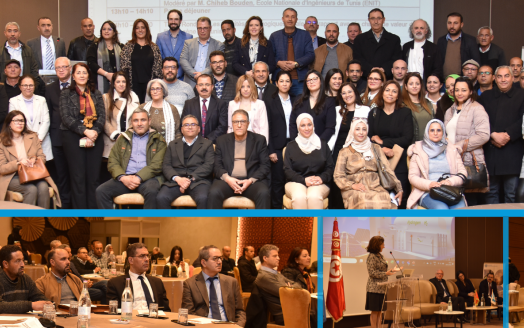
28 February 2024
Events
Empowering Tunisia's green hydrogen future: fostering collaborations and developing skills
The UNIDO team, together with the National Engineering School of Tunis (ENIT) and in support of the Tunisian Ministry of Industry and Energy (MIME), organized a stakeholder workshop for educational institutions on green hydrogen skills along local value chains. In many countries dealing with green hydrogen, including Tunisia, there's a need to upskill and reskill existing technical areas to generate local employment opportunities. Under the Global Programme for Hydrogen in Industry, the UNIDO team has developed a comprehensive methodology to identify and address human capital gaps for the value chain of green hydrogen. ✅ With the opening remarks of Mr. Belhassen Chiboub, from the Ministry of Industry and Energy, Her Excellency the Austrian Ambassador to Tunisia, Ms. Ulla Kraus-Nussbaumer, and Mr. Lassaad Ben Hassine, Tunisia Country Representative Office (UNIDO), the workshop marked the starting point to map essential skills and occupational profiles across all stages of the hydrogen value chain in Tunisia. ✅ The UNIDO team presented the UNIDO methodology for conducting skills gap assessments, aiming to optimize resources to tackle potential deficiencies in countries like Tunisia. ✅ Two-panel discussions, one dedicated to technical universities and the other to vocational centres, aimed at strategizing education plans to cultivate local talent in green hydrogen-related fields. Featuring European experts and representatives from Hydrogen Europe Research, Technische Universität Wien, Technische Universität Graz, and HyCentA Research GmbH, alongside key figures from the private sector, diverse government ministries, and national and international organizations including Deutsche Gesellschaft für Internationale Zusammenarbeit (GIZ) GmbH and International Labour Organization, the workshop was marked by active engagement. More than 100 participants, with approximately 50% women participation, gathered in a unique workshop facilitating discussions among peers from different levels of technical education. This diverse gathering fostered interactive dialogue and paved the way for multi-sectoral partnerships. 🤝 With the support of the Austrian Ministry for Climate Action, Environment, Energy, Mobility, Innovation and Technology (BMK).

